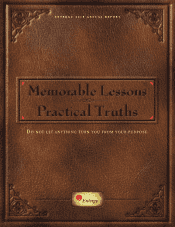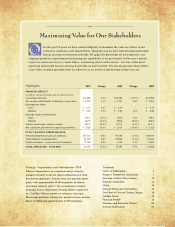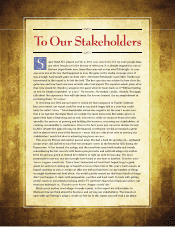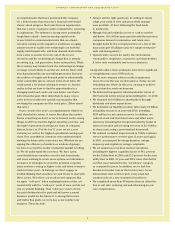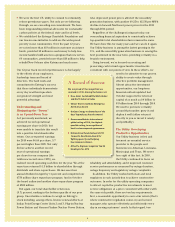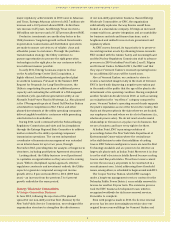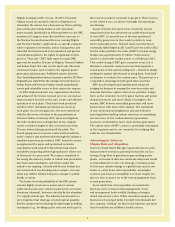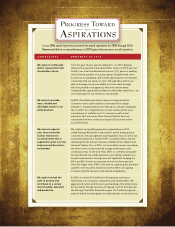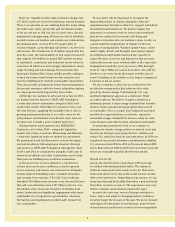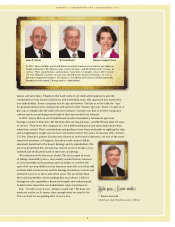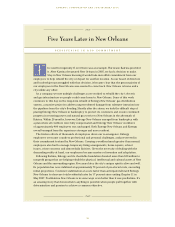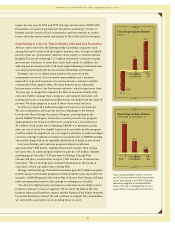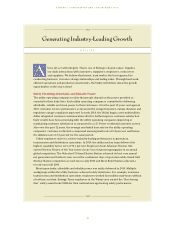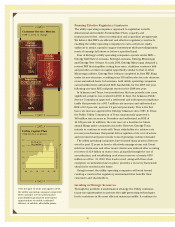Entergy 2010 Annual Report Download - page 10
Download and view the complete annual report
Please find page 10 of the 2010 Entergy annual report below. You can navigate through the pages in the report by either clicking on the pages listed below, or by using the keyword search tool below to find specific information within the annual report.
However, regardless of the risks of climate change, the
U.S. Gulf Coast faces increased risks from natural hazards.
There is no question we are suffering from this today. Along
the Gulf Coast, safety, prosperity and the vibrant quality
of life are not just at risk, but also in some cases, already
diminished or disappearing. All three are critical attributes
needed to raise our families and sustain our communities.
In Louisiana alone, we lose 25 to 35 square miles of
coastal wetlands a year through subsidence, sea level rise
and erosion. The livelihoods of 12 million people that live
near the coast, the sustainability of rich natural resources
that support $634 billion in annual GDP and the security
of residential, commercial and industrial assets valued at
more than $2 trillion are increasingly vulnerable to storm
surge, fl ooding and wind damage. Recent storms like
hurricanes Katrina, Rita, Gustav and Ike provide a glimpse
of what the future could bring if we don’t plan for and
invest in building more resilient, sustainable communities.
They also provide an important lesson demonstrating how
the poorest among us, with the fewest adaptation options,
are disproportionately impacted by these risks.
At Entergy, we continue to advocate for action. In 2010,
we funded with the America’s WETLAND Foundation
a study that shows communities along the Gulf Coast
could suffer nearly $700 billion in economic losses over
the next 20 years, applying the multiplier effect, due to
growing environmental risks. It is a call to arms for all
policymakers and includes cost-effective steps that can
be taken now to build a more resilient Gulf Coast.
Entergy leaders participated in the DELTAS2010
Conference in October 2010 – along with legislative
leaders from Texas, Louisiana, Mississippi and Alabama
– where the landmark study we funded was presented.
We participated and led discussions on how the region
can build resiliency following major disasters. Entergy
and America’s WETLAND Foundation will take the study
in 2011 and 2012 to communities along the Gulf Coast to
inform local offi cials and other stakeholders and to help
them plan for building more resilient communities.
In the near term, we have attractive, cost-effective
actions that can increase resiliency, assist the growth
of our economy and restore our environment. Examples
include improved building codes, wetland restoration
and stronger levee systems. The Gulf Coast study has
identifi ed $49 billion in investments over the next 20 years
that will cost-effectively avert $137 billion in losses over
the lifetime of the measures. However, it will take bold
vision, leadership and signifi cant engagement with many
stakeholders to recognize the opportunities, eliminate
the barriers and implement a resilient path forward for
our communities.
To succeed it will be important to recognize the
human dimensions of climate adaptation. Effective
adaptation must be built on efforts to support individuals,
households and businesses. We must recognize the
importance ecosystem services from coastal wetlands
play in our cultural and economic well-being and
integrate restoration into our resilience plans. Lastly, we
cannot forget the implications of climate on the low-
income or unemployable. Warmer summer days, colder
winter nights, fl oods and droughts have greater impact
on individuals and families that lack the capacity to
adapt. We must reach out and help those that are most
vulnerable become more resilient while at the same time
helping them break the cycle of poverty. Why Entergy?
If not us, who? While we cannot do it alone, who will try
harder or care more about the people and the area we
serve? Standing on the sideline as the largest company in
Louisiana is not an option.
We also continue to advocate on a federal level for
an effective energy policy that addresses the risks
posed by climate change. Unfortunately, U.S. cap-
and-trade legislation appears at a stalemate. There
are other options. We believe Congress should (at a
minimum) pursue a clean energy standard that includes
nuclear, clean coal and natural gas generation as well
as renewables. This is a much more balanced, practical
and effective approach than a restrictive, expensive
renewable energy standard that focuses solely on wind,
solar, biomass and other heavily subsidized renewables.
As previously mentioned, even as we continue to
advocate for climate change policies at federal, state and
local levels, Entergy is pursuing efforts to stabilize and
reduce CO
2
emissions from its own operations. In 2010, we
completed our second voluntary commitment to stabilize
CO
2
emissions from 2006 to 2010 at 20 percent below 2000
levels. Emissions for 2006 to 2010 were more than 3 percent
below our cumulative goal for the fi ve-year period.
Words to Live By
Aesop, who lived in Greece more than 2,000 years ago,
is credited with writing the fi rst fables. The universal
truths he expressed remain words to live by. That fact is
reinforced almost every day as the world evolves and life
offers new experiences. Depending on our actions, we can
always go back and fi nd a fable that offers a practical truth
that either saved us or cost us. The experiences may vary,
but the common sense wisdom remains the same.
In much the same way, even as Entergy continues to
learn, evolve and adapt to changing market conditions,
we never forget the lessons of the past. We move forward,
adhering to the discipline of our dynamic, point-of-view-
driven business model and a sound set of non-negotiable
8

